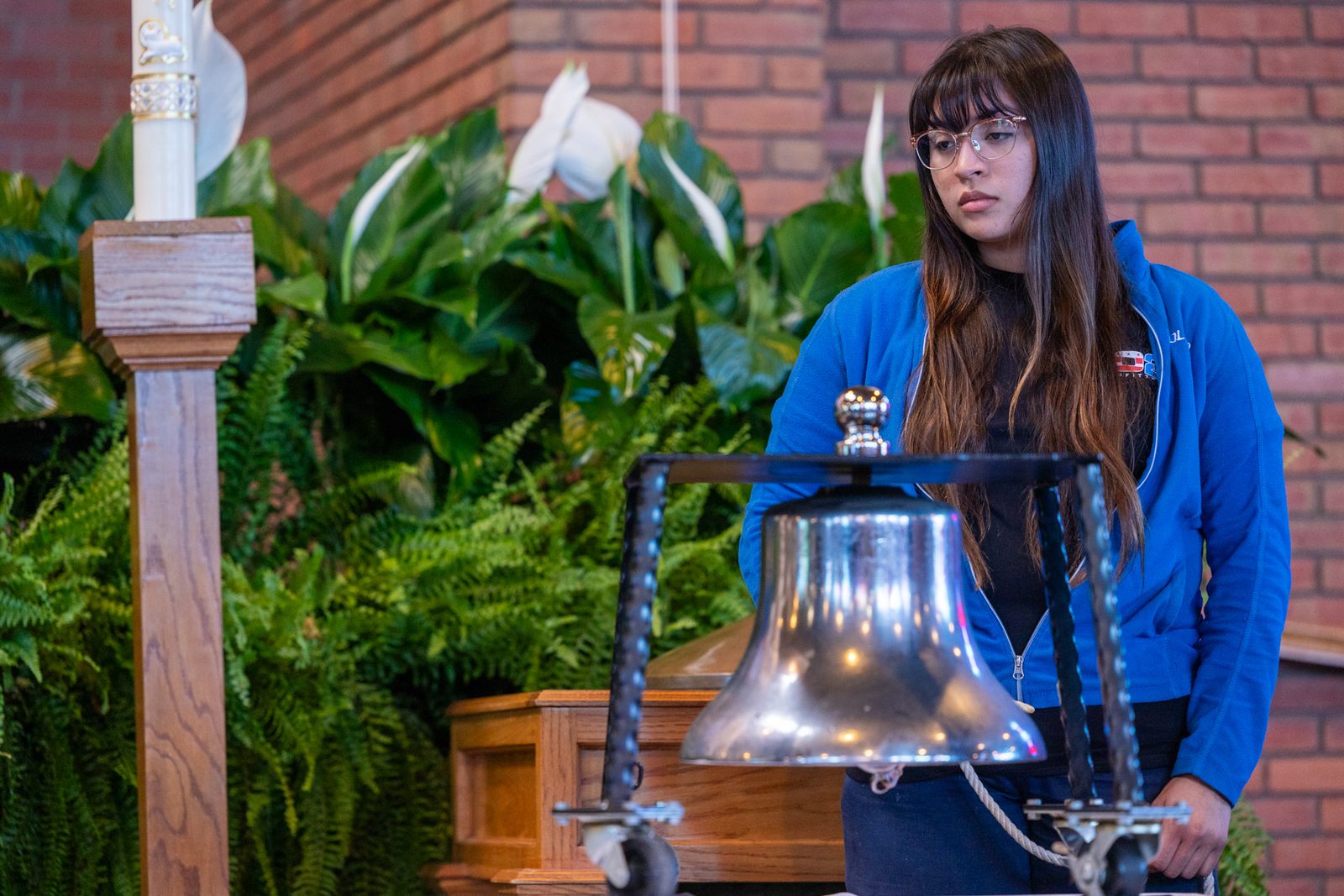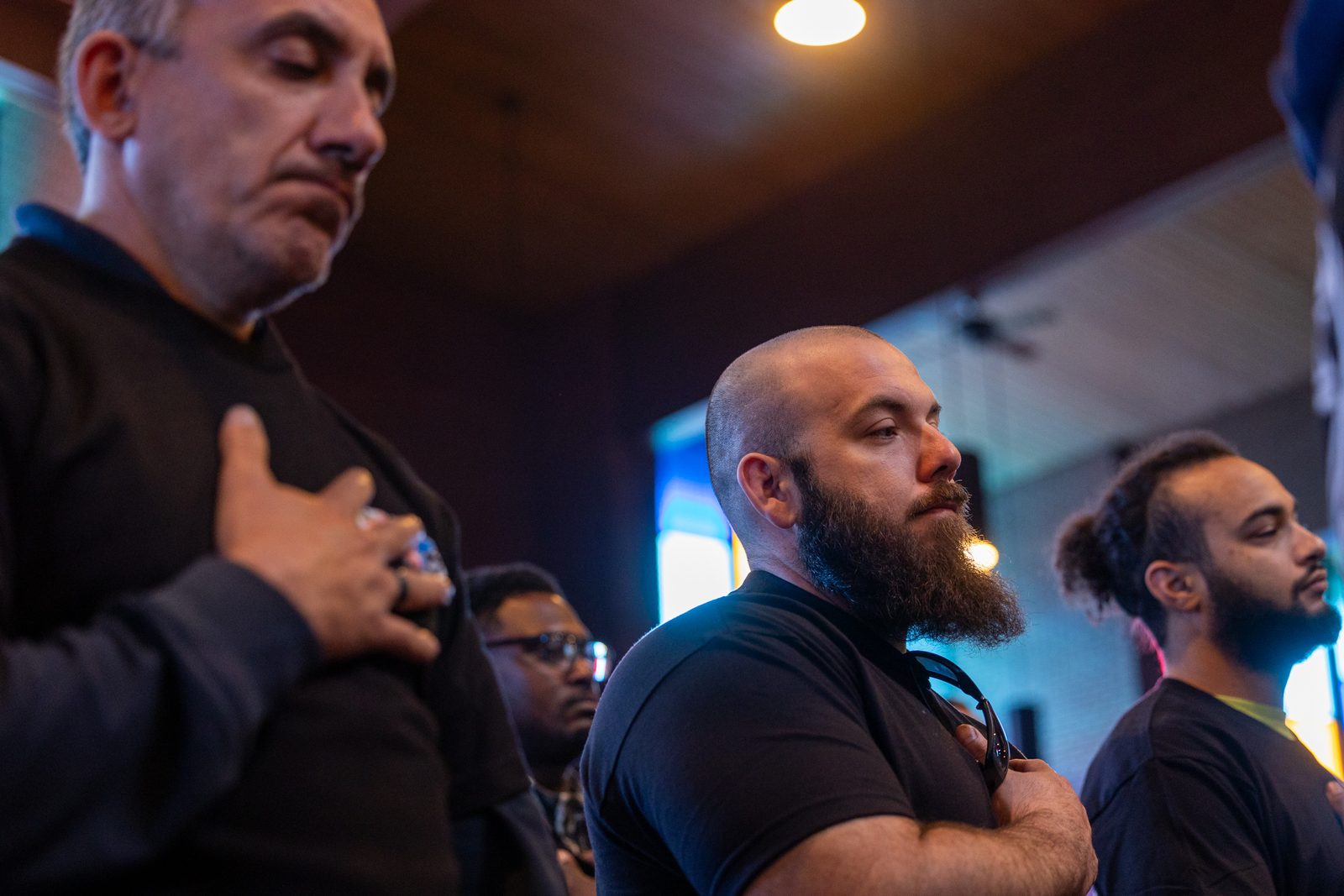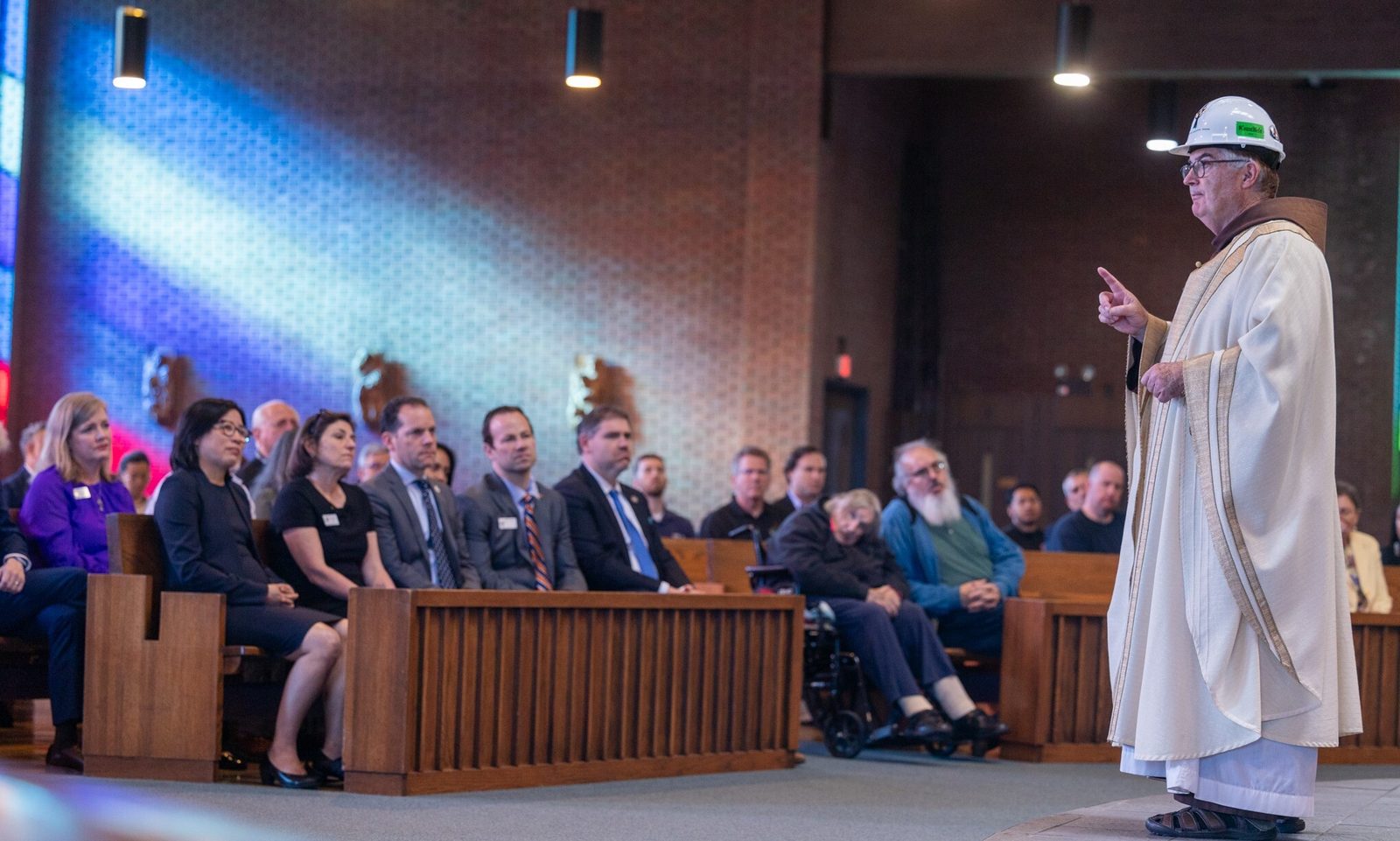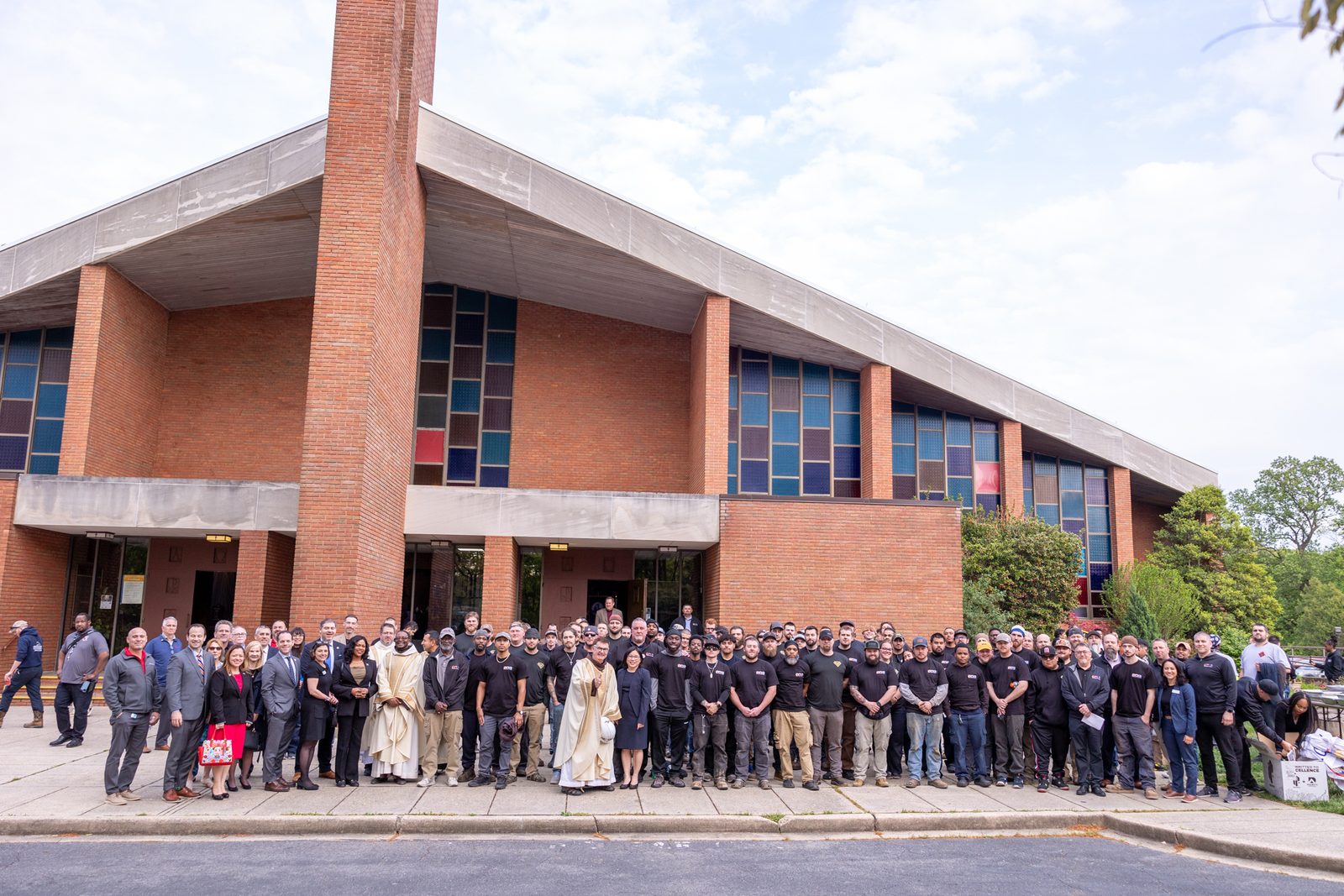As hundreds of building trades union members stood and held their hands over their hearts at St. Camillus Church in Silver Spring on April 25, a bell tolled 20 times, as the names of 19 construction workers who died on the job this past year in Washington, D.C., Maryland and Virginia were read aloud. The 20th tolling of the bell represented the construction workers whose names are not known who may have died at their workplaces during that time.
During the fourth annual Building Trades’ Workers Memorial Mass at the Maryland parish, Franciscan Father Brian Jordan, the pastor, wore a white hard hat with a cross on it, and incensed 20 white hard hats placed with roses on chairs in a semicircle in front of the altar.
Each of those hard hats bore the names of fallen construction workers, and the six helmets in the center had the names of the workers who were killed on March 26 while doing overnight road repairs on the Francis Scott Key Bridge in Baltimore, after a large cargo ship slammed into the bridge and caused it to collapse.
Front and center before the altar, and front and center in the minds of the workers and officials attending the Mass, were the hard hats with the names of those six workers who were all Hispanic immigrants to the United States – Alejandro Hernández Fuentes and Carlos Daniel Hernández from Mexico, Dorlian Ronial Castillo Cabrera and Jose Mynor Lopez from Guatemala, Miguel Luna from El Salvador, and Maynor Yassir Suazo Sandoval from Honduras.
After doing their jobs that night, “they wanted to go home to their families and loved ones,” said Father Jordan, noting that 14 of the 19 construction workers who died on the job in the tri-state area this past year were Hispanic.


The annual Mass is held in conjunction with Workers Memorial Day, which is marked around the world on April 28. The AFL-CIO on a related web page noted that “each day, more than 340 workers are killed and more than 6,000 suffer injury and illness because of dangerous working conditions that are preventable.”
Positioned near the altar were banners from several participating unions, including for painters and allied trades, plumbers and gasfitters, steamfitters and electrical workers. Other trade unions represented at the Mass included carpenters, laborers, sheet metal workers and teamsters. Many of the participating union members wore matching shirts with their union’s symbols.
Father Jordan – who also celebrated a May 1 Mass at St. Patrick’s Cathedral in New York City on the Feast of St. Joseph the Worker – noted in his homily how fitting it was for the first reading to be the creation account from the Bible’s Book of Genesis.
“Construction workers have a unique way of being co-creators,” he said. “Look at every building, every room… construction workers built that, even rocket ships that go to the moon.”
The Franciscan, known as a labor priest, is the son of a Teamsters Union member, and he celebrated Masses at Ground Zero for 10 months after the 9/11 terrorist attacks on the World Trade Center, ministering to rescue and recovery workers of all faiths there.
Father Jordan noted the responsorial psalm at the Mass, “Lord give success to the work of our hands,” from Psalm 90.
“Construction workers have sacred hands,” he said, adding that it is not only priests or surgeons or nurses or teachers who have sacred hands. “You’re working with your hands, and you’re co-creating the world.”
The priest said the Mass was a time to honor the memory of construction workers who died on the job, “and to remember their loving families.”
Paying tribute to the important role that immigrant workers play in the country, Father Jordan said that too often those workers are exploited, and he said every year, the majority of construction workers who die on the job are Latino.
“All they want to do is live the American dream,” the priest said, noting that Hispanic workers face discrimination, as his Irish ancestors once did in this country. He said immigrant groups who were once oppressed should not support the oppression of new immigrants.
“The border is right here…,” he said. “We should be the great American frontier of opportunity.”

Father Jordan, who is from Brooklyn, celebrated the Mass with two Franciscan priests who serve at St. Camillus, Father Juan de la Cruz Turcios, who has roots in El Salvador, and Father Jean-Marie Kabango-Lenge from the Democratic Republic of the Congo.
In his homily, the priest noted that in his own work, he faces stress as he serves a busy parish that is “multicultural, multilingual and multi-complicated.” Noting that he relies on a spiritual director for help, he said, “We’re not machines or robots. We’re human beings, and we have our limits,” and he encouraged workers to talk with someone if they are going through difficult times.
“Don’t keep it to yourself, Booze and drugs don’t work. Talk to someone,” Father Jordan said, pointing out that in the past year, there were seven fentanyl-related funerals at his church for people under 21.
Concluding his homily, the Franciscan priest reflected again on the six workers who died when the Baltimore bridge collapsed. Father Jordan suggested that the rebuilt bridge be named “the Workers Memorial Bridge.” Both native-born American workers and immigrant workers seek the same ultimate destination, heaven, he said, adding, “We’re all brothers and sisters.”
At the Mass, prayers were offered for those who die or are injured on the job, and also for those involved in building projects, including workers, contractors, builders, developers and officials from government agencies.

In remarks after Communion, Portia Wu, the Secretary of Labor for the State of Maryland, said, “We hold these fallen workers in our minds and hearts.”
“Each of these hats represent a person who did what we do every day, they went to work,” she said.
Those first generation immigrants who died in the Baltimore bridge collapse sought to build better lives for themselves and their families, and “they were here to help us build a better country,” Maryland’s Labor Secretary said.
Secretary Wu noted the dangers of construction work, and how one-third of the deaths on the job in Maryland happen to construction workers, even though they represent less than five percent of the state’s workforce. She remembered how at last year’s memorial Mass, those mourned included six construction workers doing road work who were killed by a high speed crash on Interstate 95.
The annual Mass, she said, offered a time to mourn the fallen workers, and a reminder always to put the safety and well-being of workers first, “and to do our best to ensure no other family will have to bear the loss of a loved one” from a workplace accident.

As the Mass concluded, Father Jordan thanked government officials and union leaders for their presence, and he offered special thanks to the construction workers there, saying, “You do make a difference. You are co-creating every day with your hands… and that makes a difference in many people’s lives.”
He invited them to attend the Labor Day Mass at St. Camillus Church on Aug. 28.

After the Mass, Lou Spencer, the assistant business manager for Plumbers and Gasfitters Local 5 who attends St. Timothy Parish in Tappahannock, Virginia, said, “This Mass is important, because we celebrate the dignity of human life, and the dignity of human labor… They’re our brothers and sisters, whether they be union or nonunion (workers).”
Mourning fallen workers, he said, offers a reminder that some “do not have access to safe job sites and decent wages.” The hard hats encircling the front of the altar represented workers who were “out doing their job,” he said.
Sidney Bonilla from Beltsville, Maryland, the assistant business manager of Steamfitters Local 602, read the names of the fallen workers at the Mass.
“It was very humbling. It’s an emotional experience. You feel for each one,” Bonilla said afterward, noting how he waited for the tolling of the bell to stop before he read each successive name. “You want to give each one the respect they deserve.”
The native of El Salvador noted that he grew up in Washington after immigrating to the United States when he was 12. After working in home improvement jobs, he joined the union, as his two brothers later did. Bonilla, who has three children, said having the wages and benefits as a union worker have been “world changing” for him and his family.
Bonilla said that too often, Hispanic workers pay the price for unsafe practices at a job site, and he agreed with Father Jordan’s idea of renaming the Baltimore bridge as “The Workers Memorial Bridge.”
“Every time we hear the news that someone passes away at a construction site, it hits home. Whether they’re union or not, we’re wearing the same shoes,” he said.












